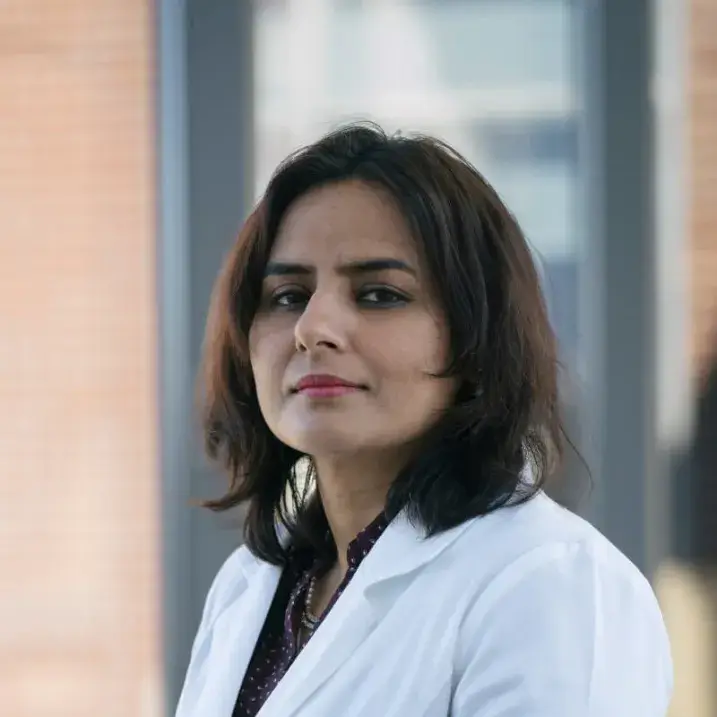FMRB 350
149 Beaumont Ave
University of Vermont
Burlington, VT 05405
United States
- Ph.D. Baylor College of Medicine
- Postdoctoral Training, Therapeutic targeting and biochemical mutagenic pathways
- Postdoctoral Training, DNA repair, bone marrow failure disorders
- Kauffman Teaching Certification, Massachusetts Institute of Technology
- BSL3 training, SARCS CoV-2 infection experiments, Ragon Institute of MIT/Harvard/MGH
- Department of Microbiology and Molecular Genetics
- University of Vermont Cancer Center Education Committee (Cellular and Molecular Biology Graduate Program)
Areas of expertise
Research expertise: DNA repair, mutagenesis, translesion synthesis, genome instability, cancer resistance, oncovirology, neurodegeneration. Other duties: mentorship, teaching, education, leadership.
BIO
Nimrat Chatterjee is an Assistant Professor at the Department of Microbiology and Molecular Genetics and member of UVM’s Cancer Center. Her work centers on the overarching question: How do mutations form in cells and how can the mutation-causing pathways be targeted for effective therapeutics?Chatterjee’s research focuses on understanding the molecular mechanisms by which mutations form, specifically, by studying the mutagenic translesion synthesis and DNA repair mechanisms that collectively cause genome instability. Applications of this work include our understanding of how cancer resistance, infectious diseases, and neurodegenerative disorders rely on genome instability mechanisms and mutagenesis to exhibit disease pathogenesis. Her laboratory has uncovered new insights of how translesion synthesis polymerases engage other cellular and biological pathways to compromise genome integrity. Her teaching draws from this research activity, including courses on Cancer Genetics, DNA repair and mutagenesis, and Genome Instability.
Courses
- MMG 3990/5270 - Cancer Genetics
- MMG 3330 - Genetics and Genomics
- BIOC 6072 - Cancer Biology
- PATH 6071 - Molecular Pathology
Publications
Awards and Achievements
- 2021: Research Spotlight, MIT News and Cancer Discovery Impactful research publication in PNAS Journal
- 2021: Nominee, Environmental and Mutagenesis Genomics Society Young Scientist Award (basis: max institute voting)
- 2022: Research Spotlight, News Medical Life Sciences Impactful research publication in BBRC Journal
- 2023: Maximizing Investigators' Research Award R35 Award Early Investigator Innovation Research Award
- 2024: Supplement to Maximizing Investigators' Research Award Award to buy additional equipment for research
Bio
Nimrat Chatterjee is an Assistant Professor at the Department of Microbiology and Molecular Genetics and member of UVM’s Cancer Center. Her work centers on the overarching question: How do mutations form in cells and how can the mutation-causing pathways be targeted for effective therapeutics?Chatterjee’s research focuses on understanding the molecular mechanisms by which mutations form, specifically, by studying the mutagenic translesion synthesis and DNA repair mechanisms that collectively cause genome instability. Applications of this work include our understanding of how cancer resistance, infectious diseases, and neurodegenerative disorders rely on genome instability mechanisms and mutagenesis to exhibit disease pathogenesis. Her laboratory has uncovered new insights of how translesion synthesis polymerases engage other cellular and biological pathways to compromise genome integrity. Her teaching draws from this research activity, including courses on Cancer Genetics, DNA repair and mutagenesis, and Genome Instability.
Courses
- MMG 3990/5270 - Cancer Genetics
- MMG 3330 - Genetics and Genomics
- BIOC 6072 - Cancer Biology
- PATH 6071 - Molecular Pathology
Publications
Awards and Achievements
- 2021: Research Spotlight, MIT News and Cancer Discovery Impactful research publication in PNAS Journal
- 2021: Nominee, Environmental and Mutagenesis Genomics Society Young Scientist Award (basis: max institute voting)
- 2022: Research Spotlight, News Medical Life Sciences Impactful research publication in BBRC Journal
- 2023: Maximizing Investigators' Research Award R35 Award Early Investigator Innovation Research Award
- 2024: Supplement to Maximizing Investigators' Research Award Award to buy additional equipment for research
Select Publications
- Wojtaszek J.#, Chatterjee N.#, Najeeb J.# Lee M., Ramos A., Bian K., Xue J., Li D., Hemann M.T., Hong J., Walker G.C. and P. Zhou. (2019). A Small Molecule Targeting Mutagenic Translesion Synthesis Improves Chemotherapy. CELL. 178(1):152-159.e11. DOI: org/10.1016/j.cell.2019.05.028. PMID: 31178121. # Co-first author. Spotlighted by MIT News. Recommended by f1000. Broadcast by 6 other news outlets. Highlighted in Nature. Spotlighted in Molecular Cell
- *Chatterjee N., Whitmann M., Harris C.A., Lee M., Jonas J., Lien E.C., Heiden M.G.V., Hong J., Zhou P., Hemann M.T. and G.C. Walker. (2020). REV1 inhibitor JH-RE-06 enhances tumor cell response to chemotherapy by triggering senescence hallmarks. PNAS. 117 (46) 28918-28921. DOI.org/10.1073/pnas.201606411. PMID: 33168727. *Corresponding author. Spotlighted at MIT News. Spotlighted at Cancer Discovery
- Victor J, Deutsch J, Whitaker A, Lamkin EN, March A, Zhou P, Botten JW, Chatterjee N. (2021). SARS-CoV-2 triggers DNA damage response in Vero E6 cells. Biochem Biophys Res Commun. 19;579: 141-145. DOI: 10.1016/j.bbrc.2021.09.024PMID: 34600299. Spotlighted at News Medical Life Sciences
- Ava Siegel, Daniel Almstead, Naveen Kothandaraman, Jessica Reich, Erica Lamkin, Joshua Victor, Aarzoo Grover, Kanayo Ikeh, Hannah Koval, Andrew Crompton, Hongjun Jang, Hyejin Lee, Roxana del Rio-Guerra, Dmitry Korzhnev, M. Kyle Hadden, Jiyong Hong, Pei Zhou, Nimrat Chatterjee; REV1 inhibition enhances trinucleotide repeat mutagenesis. Open Biol 1 December 2025; 15 (12): 250234. https://doi.org/10.1098/rsob.250234
- Buntin B, Guyette M, Gupta V, Ikeh K, Bhattacharya S, Lamkin EN, Lafuze A, Del Rio-Guerra R, Hong J, Zhou P, Chatterjee N. REV1 Loss Triggers a G2/M Cell-Cycle Arrest Through Dysregulation of Mitotic Regulators. Genes (Basel). 2025 Dec 31;17(1):44. doi: 10.3390/genes17010044. PMID: 41595464; PMCID: PMC12841074.
Our Lab Focus
Lab Team
Brailey Buntin
Jessica Reich
Joshua Victor
